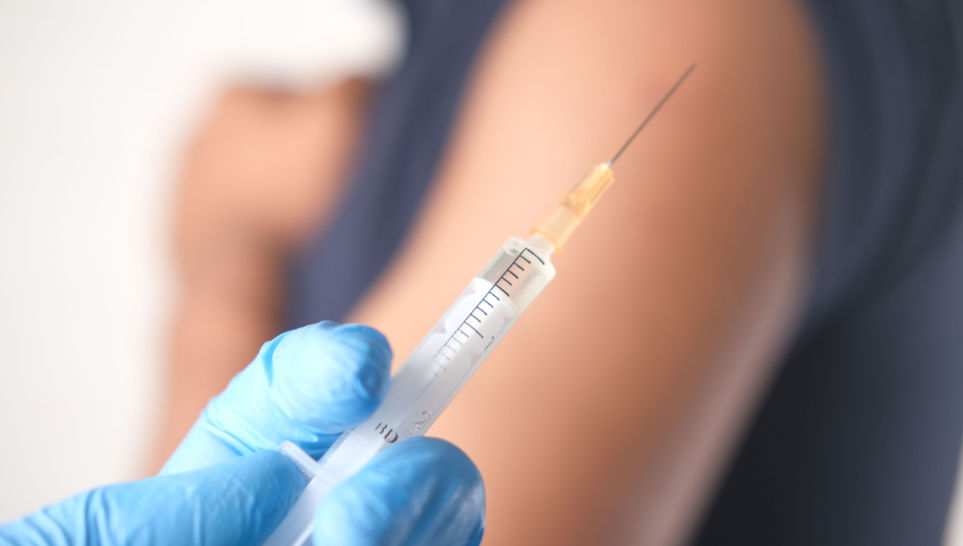The measles, mumps, and rubella (MMR) vaccine is common among children throughout different periods of their lives. Like many other vaccines, the MMR vaccine has some potentially dangerous and life-threatening side effects. Some of the severe side effects include brain damage, deafness, seizures, and bleeding disorders.
Measles, mumps, and rubella are all diseases that have a wide range of uncomfortable symptoms. They are viral infections and can cause fevers, swelling, rashes, cough, and congestion. Sometimes, infections can spread to the lungs and cause devastating illnesses like pneumonia.
MMR Vaccine Overview
The MMR is a combination vaccine that helps prevent measles, mumps, and rubella (also known as German measles). After the first two doses of the MMR vaccine, roughly 90-97% of people are protected from all three infections. People usually receive their first two doses during childhood, but those unable to prove immunity can get the vaccine at any time.
The vaccine is a live vaccine, meaning it contains living samples of measles, mumps, and rubella. However, the pathogens are severely weakened. Live vaccines help stimulate the immune system but don’t cause the disease to occur in healthy people. With that in mind, those with a weakened immune system might experience complications from the injection.
Understanding Measles, Mumps, and Rubella
Measles, mumps, and rubella are all viral infections. Like many viruses, they can cause fever, malaise, and other uncomfortable symptoms. All three diseases are extremely contagious and could end up being life-threatening.
Measles
Measles begins in the respiratory system. Although the MMR vaccine is widely available, measles still infects millions of people every year. In 2017, roughly 100,000 people were killed by the virus worldwide. Measles has an incubation period of 10-12 days, and some of the most prevalent symptoms are fever, runny nose, cough, and white spots in the mouth.
People infected with measles can spread the virus through the air via respiratory droplets. If the infected person coughs or sneezes, anybody nearby could potentially get infected. That’s why many schools require students to have an MMR shot before attending.
Mumps
Mumps is another contagious viral infection that passes through saliva, mucus, and close contact. The virus mainly affects the salivary glands, which are the glands on each side of your face responsible for producing saliva. Swollen salivary glands are the leading symptom of mumps.
Other symptoms include body aches, reduced appetite, fatigue, and fever. Although most people infected with the mumps virus show symptoms, some people might not show any at all. Asymptomatic people are still contagious and can spread the infection quickly.
Rubella
Rubella, or German measles, is a viral infection that causes a large red rash all over the body. Other than the rash, people infected with rubella might also experience fever, swollen lymph nodes, and intense body aches.
Like measles and mumps, rubella spreads through contact with infected droplets. If you touch an infected surface, then touch your face or mouth, you will likely develop rubella.
Rubella is quite rare in the United States, but there are still numerous cases worldwide. The virus will usually go away on its own after about a week. However, those with certain health conditions may experience complications or more severe symptoms that require medical attention.
History of the MMR Vaccine
The MMR vaccine was created in 1971 in West Point, Pennsylvania, by Maurice Hilleman at the Merck Institute for Therapeutic Research. Before the MMR, measles, mumps, and rubella each had a specific vaccine. The MMR is a combination of all three vaccines, which makes preventing each illness less painful than immunizing patients three times at once.
Since its release, over 500 million doses have been given worldwide. Before the vaccine, measles killed more than 2.6 million people every year. From 2000 to 2016, measles deaths dropped by roughly 84%. It’s almost impossible to find a case in the United States, although the viruses are still prevalent in low-income countries.
Side Effects/Reactions
Since the MMR vaccine contains live viruses, there are several potential health risks. There’s no vaccine out there that is entirely safe, and that’s why the United States government created the Vaccine Injury Compensation Program (VICP).
Some of the adverse effects of the MMR vaccine are:
- Fever
- Puffy eyes
- Runny nose
- Brain damage
- Seizures
- Bleeding disorders
- Severe allergic reactions
The MMR vaccine can affect both children and adults. Severe cases of an adverse reaction to the MMR vaccine will require long-term medical care. Additionally, adults affected by the MMR vaccine might not be able to attend work.
Who Should Not Get the MMR Vaccine
The Center for Disease Control (CDC) currently has a list of people who should avoid getting the MMR vaccine, such as:
- Those who have cancer and are receiving chemotherapy or other treatments that might weaken the immune system
- Those who are allergic to neomycin or other ingredients in the vaccine
- Those with HIV, AIDS, or autoimmune diseases
- Those who previously had an allergic reaction to the MMR vaccine
- Those who have tuberculosis
- Pregnant women
- Those who are currency sick
If you’re unsure whether you should receive the MMR vaccine, consult with your doctor. Only they can give you the right advice and determine whether getting the vaccine is the right thing for you.
FAQs
Do Adults Need the MMR Vaccine?
Although the vaccine is more common in children, adults can get the MMR vaccine. Any adult who doesn’t have any evidence of immunity to the three viruses can consider getting the MMR vaccine. However, it’s wise to consult your doctor before getting vaccinated.
How Long Does It Take for the Vaccine to Make You Immune?
The body needs time to produce antibodies that will help fight off the measles virus. The time between initial injection and immunity is usually 2 to 3 weeks.
How Long Does the MMR Vaccine Last?
People who receive two doses of the MMR vaccine are generally protected for life and don’t need a booster shot.
Does the MMR Vaccine Hurt?
Doctors consider the MMR vaccine to be extremely safe and effective. Barring adverse side effects, the only pain you should feel after getting your vaccine is mild soreness around the injection area.
Can You Still Get Measles if You Receive the MMR Vaccine?
Although it’s still possible to get infected with measles after receiving the MMR vaccine, it’s highly unlikely. Studies show that only 3% of vaccinated children develop measles after being immunized.
Are You Contagious After the MMR Vaccine?
No one who has received the MMR vaccine can spread the virus, even if a rash appears. However, if you or your child show symptoms after being vaccinated, you must seek medical attention right away.
How Do I Know if I Have Had the MMR Vaccine?
To determine whether you got the MMR vaccine as a child, ask your doctor for a blood test. With a proper blood test, the doctor can see if you have measle-specific antibodies, which indicate that you’ve already received the vaccine. Another way is to check your medical records. The doctor should have made a note if you got the vaccine as a child.
What to Do if You Experience an MMR Vaccine Injury
The likelihood of developing any life-threatening conditions after getting the MMR vaccine is extremely low. However, when people do get affected, the outcome is generally severe and detrimental to their health. If you or a loved one has experienced an MMR vaccine injury, you must see a doctor right away.
Some of the MMR vaccine side effects can leave you permanently injured. As a result, the Vaccine Injury Compensation Program can help cover the cost of medical and legal services. Schedule a free case review and speak to one of our vaccine injury attorneys to see if you’re legally eligible for financial compensation.
TRANSVERSE MYELITIS AFTER FLU VACCINE
$175,000.00 total settlement from a 52 year old man who developed transverse myelitis or TM as a result of the influenza vaccination. (maximum available recovery of $250,000.00).
CHRONIC ARTHRITIS AFTER MMR AND TDAP VACCINES
$225,000 settlement for adult female who suffered from rubella-induced chronic arthritis and Wegener’s granulomatosis after receiving MMR and Tdap vaccines
THROMBOCYTOPENIA PURPURA AFTER MMR VACCINE
$15,000.00 settlement for a woman from Alabama who developed thrombocytopenia purpura and urticarial vasculitis as a result of the HepB and Measles-Mumps-Rubella or MMR vaccines.
ARTHRITIS AND WEGENER’S GRANULOMATOSIS AFTER MMR AND TDAP VACCINES
$225,000.00 settlement for a woman from North Carolina who developed rubella-induced chronic arthritis and Wegener’s granulomatosis as a result of receiving a measles-mumps-rubella or MMR vaccine and tetanus-diphtheria-acellular pertussis or Tdap vaccine.
MULTIPLE INJURIES AFTER MMR VACCINE
$20,000.00 settlement for a 49 year old woman developed arthralgia, myalgia, myositis, muscle weakness, bilateral bursitis in both knees, and numbness, tingling, and pain as a result of receiving the MMR vaccine.
MULTIPLE INJURIES AFTER MMR VACCINE
$20,000.00 settlement for a 49 year old woman developed arthralgia, myalgia, myositis, muscle weakness, bilateral bursitis in both knees, and numbness, tingling, and pain as a result of receiving the MMR vaccine.
BRACHIAL NEURITIS AFTER MULTIPLE VACCINES
$250,000 settlement for adult male who suffered from brachial neuritis after receiving influenza, Tdap, meningococcal, hepatitis A, hepatitis B, IPV, and MMR vaccines.
BRACHIAL NEURITIS AFTER MULTIPLE VACCINES
$250,000.00 settlement for a 19 year old man enlisted in the army, who developed brachial neuritis as a result of receiving the influenza vaccine, tetanus diphtheria accellular pertussis or Tdap vaccine, meningococcal vaccine, hepatitis A and B vaccines, polio inactivated or IPV vaccine, and measles mumps and rubella or MMR vaccine.






